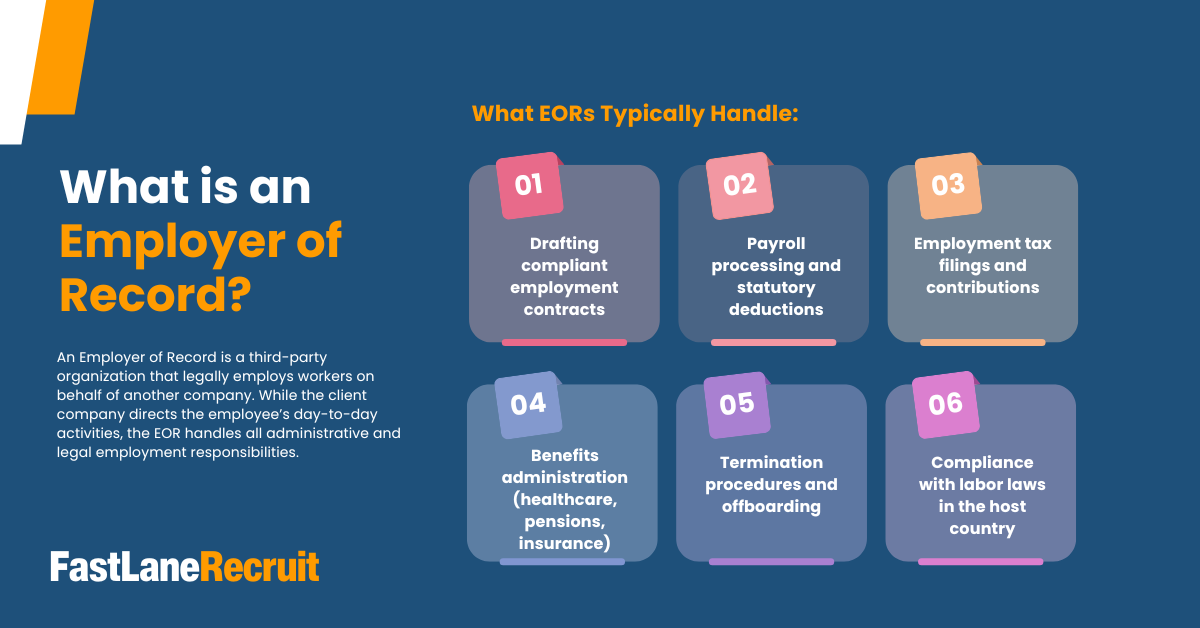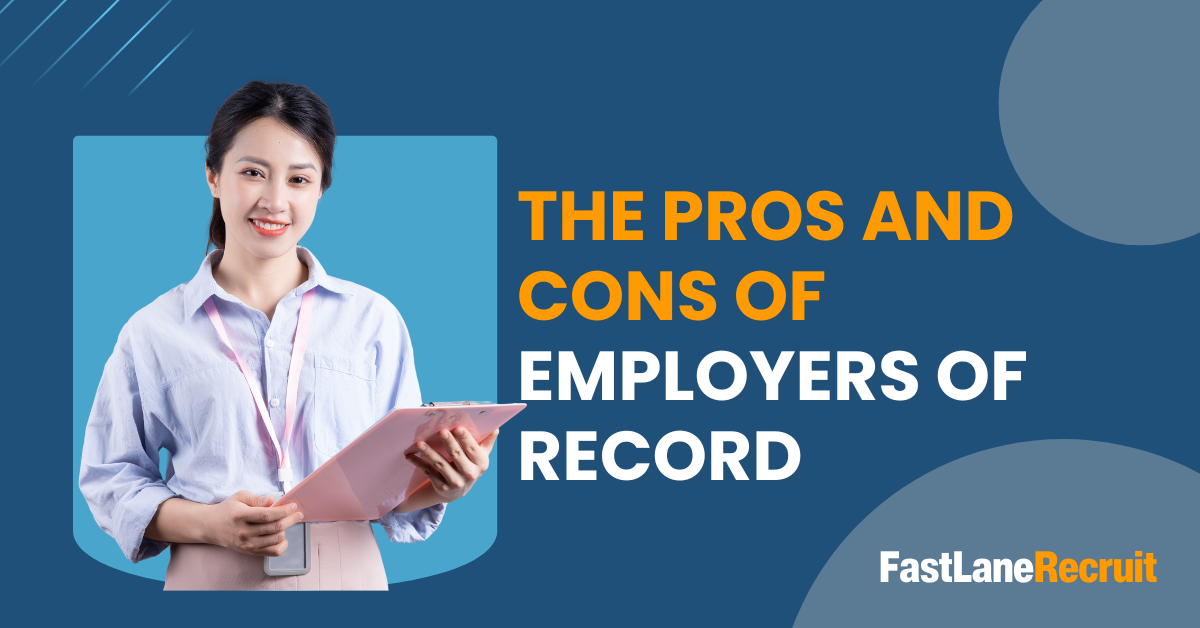In today’s globalized economy, businesses are increasingly turning to cross-border hiring to tap into international talent pools, test new markets, and scale rapidly. However, hiring employees in foreign jurisdictions can be complicated by unfamiliar labor laws, tax regulations, and compliance risks.
An Employer of Record (EOR) serves as a legal employer on your behalf in the host country, managing everything from onboarding to payroll and statutory filings. This model can dramatically simplify international hiring, but it’s not without trade-offs. This blog explores the pros and cons of EOR arrangements, key compliance considerations, and how to determine if this model is right for your business.
Content Outline
Key Summary
EORs simplify international hiring and eliminate the need for local legal entities.
They ensure compliance with local labor, tax, and immigration laws.
Risks include reduced employer control, legal complexity, and long-term costs.
Businesses should assess scalability, compliance, and the EOR’s transparency.
FastLaneRecruit offers EOR services in Malaysia, ensuring full HR and legal compliance.
What is an Employer of Record?
An Employer of Record is a third-party organization that legally employs workers on behalf of another company. While the client company directs the employee’s day-to-day activities, the EOR handles all administrative and legal employment responsibilities.
What EORs Typically Handle:
- Drafting compliant employment contracts
- Payroll processing and statutory deductions
- Employment tax filings and contributions
- Benefits administration (healthcare, pensions, insurance)
- Termination procedures and offboarding
- Compliance with labor laws in the host country
This model allows companies to expand globally without establishing a legal entity, which can be both costly and time-consuming.
Also Read: Guide to PEO vs EOR

Pros and Cons of Employers of Record
| Pros | Cons |
| Enables rapid market entry | Limited direct control over HR processes |
| Avoids the cost of setting up a legal entity | Potential mismatch in company culture and values |
| Eases compliance with local labor laws | Long-term use can become expensive |
| Centralizes payroll and benefit management | Dependence on third party for legal obligations |
| Suitable for short-term, remote, or contract roles | Risk of reputational damage if EOR acts unethically |
EORs are particularly helpful for businesses in pilot phases, hiring remote-first teams, or scaling operations without local infrastructure. However, if you’re hiring for strategic leadership positions or planning long-term market presence, you may eventually need to form your own legal entity.
Also Read: Hiring Malaysian Talent: Employer of Record Malaysia Guide
Check Key Employment Law Issues
Every country has unique employment legislation. Companies must ensure that employment contracts, benefits, and termination terms are aligned with local labor standards, even when operating through an EOR.
Key Legal Issues to Consider:
- Statutory leave requirements (e.g., sick leave, maternity/paternity leave)
- Termination laws: Are there minimum notice periods? Is severance mandatory?
- Overtime and working hours regulations
- Collective agreements or unions
Violating these laws can lead to fines, disputes, or reputational harm. Refer to country-specific resources like:
- U.S. Department of Labor – Wage and Hour Division
- MOM Singapore – Employment Practices
- Fair Work Ombudsman – Australia
- Malaysia Department of Labour
Ask the Critical Compliance Questions
Even though the EOR is the legal employer, the client company bears responsibility if things go wrong. It is essential to thoroughly evaluate the EOR’s processes and compliance track record.
Ask These Questions:
- Are employment contracts regularly updated to reflect local law changes?
- Is the EOR properly licensed and registered in the country?
- How are payroll taxes, benefits, and social security contributions managed?
- How does the EOR classify employees and contractors?
- What happens in the event of a dispute or employee complaint?
It’s advisable to conduct periodic audits and insist on compliance reports from your EOR to mitigate any shared liability.
Also Read: How to Effectively Hire and Manage Remote Employees: A Comprehensive Guide
Protect Business Interests When Using Employers of Record
Using an EOR means delegating legal employment, but companies must still protect their own business interests, especially when it comes to intellectual property, data security, and employee engagement.
Practical Protections Include:
- Confidentiality and IP clauses in employment agreements
- Legal frameworks ensuring that all employee output is owned by your business
- Policies governing the use of sensitive information and tools
- Clear internal reporting lines for feedback and communication
Additionally, choose an EOR that offers transparent service-level agreements (SLAs), multilingual support, and industry-specific expertise.
Also Read: Benefit of Outsourcing Accounting to Malaysia
Consider Immigration Issues
EORs typically hire local employees, but immigration complexities arise when you wish to relocate a worker or hire foreign talent in another country.
Points to Consider:
- Can the EOR sponsor visas or employment passes?
- Are there industry-specific restrictions for hiring foreign workers?
- Will the EOR handle visa renewals and compliance with immigration law?
Some jurisdictions, such as Malaysia, Singapore, and the United States, enforce strict regulations on foreign employment, including quotas, levies, or labor market tests.
Refer to official immigration departments for the most accurate and up-to-date requirements:
- Immigration Department of Malaysia
- Immigration & Checkpoints Authority (ICA) – Singapore
- U.S. Citizenship and Immigration Services (USCIS)
Staying informed through these portals can help ensure that your workforce expansion complies fully with local immigration laws and avoids costly oversights.
Get the Basics Right
Before you sign with an EOR, ensure all foundational aspects are well structured.
EOR Partnership Essentials:
- Clear delineation of roles and responsibilities
- Service fee structure and cost transparency
- Defined onboarding and offboarding procedures
- Guaranteed timeliness of payroll and statutory filings
- Clarity on jurisdiction in case of legal disputes
It’s also critical to ensure that local cultural practices, languages, and employee expectations are acknowledged and respected in the employment experience.
Also Read: 5 Team-Building Tips for Your Remote Team
Additional Considerations Before Choosing an EOR
Scalability and Flexibility
An ideal EOR should grow with your business. Whether you’re expanding from 5 to 50 employees, your EOR must support multi-country operations, volume hiring, and custom reporting.
Impact on Employee Experience
While the EOR handles the technical side of employment, the human experience, onboarding, career development, and company culture still fall on the client company. Partnering with an EOR who values the employee journey is crucial for retaining top talent.
Exiting the EOR Arrangement
At some point, you may want to migrate employees from the EOR to your own local entity. Ensure the EOR has a structured exit strategy, including transfer of employment contracts and continuity of benefits.
Conclusion
Employers of Record are an effective solution for companies looking to expand internationally, hire remote workers, or test foreign markets without the overhead of entity setup. They offer a powerful mix of speed, compliance, and convenience.
However, the model comes with operational risks and limitations, including reduced HR control, legal dependency, and higher long-term costs. Businesses must evaluate each EOR’s compliance, scalability, and employee handling capabilities before proceeding. When managed correctly, EOR partnerships can serve as a launchpad for global growth.
How FastLaneRecruit Can Help
FastLaneRecruit supports businesses with end-to-end Employer of Record (EOR) services across Asia-Pacific, including hiring remote employees in Malaysia. Whether you’re hiring your first remote employee or entering a new market, our services ensure full compliance and minimal operational hassle.
Our EOR Services Include:
- Drafting and executing compliant employment contracts
- Payroll processing, statutory contributions, and benefits administration
- Handling of employment tax and social security filings
- Managing employee onboarding and exits
- Ongoing HR support and legal compliance audits
In Malaysia, we help businesses quickly access the local talent market while staying aligned with EPF, SOCSO, and EIS regulations under the Department of Labour Malaysia. Whether you are hiring engineers, marketing professionals, or customer service teams, our Malaysia EOR solutions ensure a smooth setup and legal peace of mind.
Partner with FastLaneRecruit to build a compliant, agile, and global workforce with confidence. Contact our team today to learn how we can tailor an EOR solution for your business needs.


